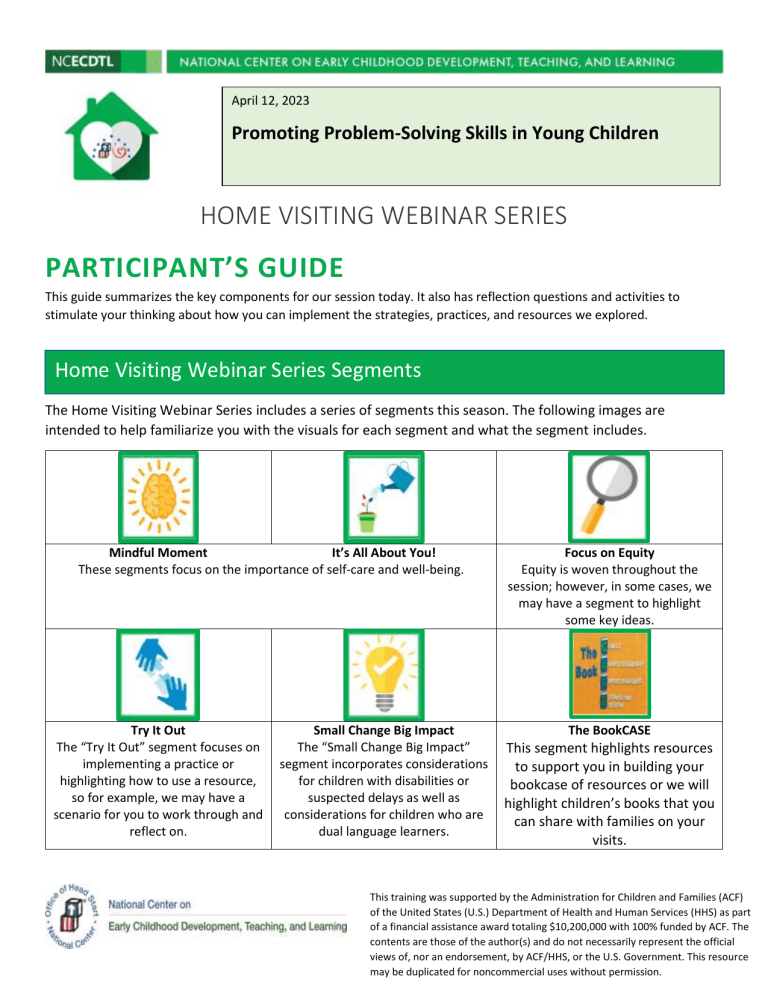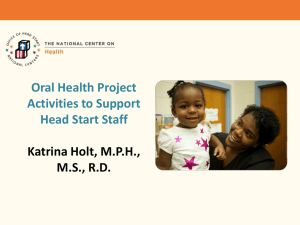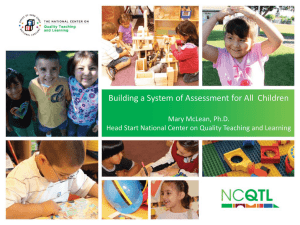
April 12, 2023 Promoting Problem-Solving Skills in Young Children HOME VISITING WEBINAR SERIES PARTICIPANT’S GUIDE This guide summarizes the key components for our session today. It also has reflection questions and activities to stimulate your thinking about how you can implement the strategies, practices, and resources we explored. Home Visiting Webinar Series Segments The Home Visiting Webinar Series will include a series of segments that could occur this season. The following The Home Visiting Webinar Series includes a series of segments this season. The following images are intended to help familiarize you with the visuals for each segment and what the segment includes. Mindful Moment It’s All About You! These segments focus on the importance of self-care and well-being. Try It Out The “Try It Out” segment focuses on implementing a practice or highlighting how to use a resource, so for example, we may have a scenario for you to work through and reflect on. Small Change Big Impact The “Small Change Big Impact” segment incorporates considerations for children with disabilities or suspected delays as well as considerations for children who are dual language learners. Focus on Equity Equity is woven throughout the session; however, in some cases, we may have a segment to highlight some key ideas. The BookCASE This segment highlights resources to support you in building your bookcase of resources or we will highlight children’s books that you can share with families on your visits. This training was supported by the Administration for Children and Families (ACF) of the United States (U.S.) Department of Health and Human Services (HHS) as part of a financial assistance award totaling $10,200,000 with 100% funded by ACF. The contents are those of the author(s) and do not necessarily represent the official views of, nor an endorsement, by ACF/HHS, or the U.S. Government. This resource may be duplicated for noncommercial uses without permission. Pyramid Model Practices The Pyramid Model is a framework of evidence-based practices for promoting young children’s healthy social and emotional development. In this episode, we are focusing on problem solving, which is tier two targeted social emotional supports. https://challengingbehavior.cbcs.usf.edu/Pyramid/overview/index.html What would you like to walk away with from this session? From this session today, I hope to: 1. LEARNING Goals 2. 3. Reflection: This training was supported by the Administration for Children and Families (ACF) of the United States (U.S.) Department of Health and Human Services (HHS) as part of a financial assistance award totaling $10,200,000 with 100% funded by ACF. The contents are those of the author(s) and do not necessarily represent the official views of, nor an endorsement, by ACF/HHS, or the U.S. Government. This resource may be duplicated for noncommercial uses without permission. Problem-Solving As a home visitor, how can I support the development of problem-solving skills? Why is problem solving important in child development? What skills do children need to be successful at problem solving? How can a home visitor be sure they are being culturally responsive to a family’s values related to relationships and problem solving? This training was supported by the Administration for Children and Families (ACF) of the United States (U.S.) Department of Health and Human Services (HHS) as part of a financial assistance award totaling $10,200,000 with 100% funded by ACF. The contents are those of the author(s) and do not necessarily represent the official views of, nor an endorsement, by ACF/HHS, or the U.S. Government. This resource may be duplicated for noncommercial uses without permission. Think Five: Five steps that support and guide children’s behavior to encourage problem solving in the moment 1. Anticipate – 2. Be close – 3. Provide support – Behavior Guidance: Problem Solving in the Moment https://eclkc.ohs.acf.hhs.gov/video/problemsolving-moment 4. Multiple solutions – 5. Celebrate success – Resource Highlight: National Center for Pyramid Model Innovations We Can Be Problem Solvers at Home I have a problem. I want to play with the blocks with my brother, but he won’t give me a turn. I could try asking nicely for him to share the blocks or I could play with something else. I take some blocks and play next to him. I get some cars and ask him for us to build a garage. I’ll try getting some cars and asking him for us to build a garage. Yay! My solution worked! This training was supported by the Administration for Children and Families (ACF) of the United States (U.S.) Department of Health and Human Services (HHS) as part of a financial assistance award totaling $10,200,000 with 100% funded by ACF. The contents are those of the author(s) and do not necessarily represent the official views of, nor an endorsement, by ACF/HHS, or the U.S. Government. This resource may be duplicated for noncommercial uses without permission. How can this resource support my work? Problem-Solving: What strategies do you see happening in this video? 1. 2. 3. 4. 5. Tips for Parents: What are the three tips highlighted in this episode? What is the home visitor’s role in supporting families with these practices? This training was supported by the Administration for Children and Families (ACF) of the United States (U.S.) Department of Health and Human Services (HHS) as part of a financial assistance award totaling $10,200,000 with 100% funded by ACF. The contents are those of the author(s) and do not necessarily represent the official views of, nor an endorsement, by ACF/HHS, or the U.S. Government. This resource may be duplicated for noncommercial uses without permission. What are key takeaways for home visitors to know when it comes to problem solving? Helpful Resources ELOF Resources Head Start Early Learning Outcomes Framework and related resources https://eclkc.ohs.acf.hhs.gov/school-readiness/article/head-start-early-learning-outcomes-framework https://eclkc.ohs.acf.hhs.gov/es/preparacion-escolar/articulo/marco-de-resultados-del-aprendizaje-temprano-de-losninos ELOF Effective Practice Guides https://eclkc.ohs.acf.hhs.gov/school-readiness/effective-practice-guides/effective-practice-guides https://eclkc.ohs.acf.hhs.gov/es/preparacion-escolar/effective-practice-guides/guias-para-la-practica-eficaz ECLKC Resources 15-Minute In-Service Suites: Problem Solving in the Moment https://eclkc.ohs.acf.hhs.gov/video/problem-solving-moment Tips for Families https://eclkc.ohs.acf.hhs.gov/sites/default/files/pdf/no-search/iss/behavior-guidance/problem-solving-familytips.pdf Using Cultural Competence to Solve Problems https://eclkc.ohs.acf.hhs.gov/culture-language/learning-module/using-cultural-competence-solve-problems Other Resources Head Start Center for Inclusion: Classroom Visuals and Supports (preschool, which can be used w/in socializations or in families’ homes) https://headstartinclusion.org/tools-and-supports/classroom-visuals-and-supports/ Friendship Visuals Friendship Kit Problem Solving Kit This training was supported by the Administration for Children and Families (ACF) of the United States (U.S.) Department of Health and Human Services (HHS) as part of a financial assistance award totaling $10,200,000 with 100% funded by ACF. The contents are those of the author(s) and do not necessarily represent the official views of, nor an endorsement, by ACF/HHS, or the U.S. Government. This resource may be duplicated for noncommercial uses without permission. Peer Mediated Social Skills and Visual Supports (available in multiple languages) https://challengingbehavior.org/document/peer-mediated-social-skills-and-visual-supports/ Problem Solving Steps (available in multiple languages) https://challengingbehavior.org/document/problem-solving-steps/ We Can Be Problem Solvers at Home! (scripted story available in multiple languages) https://challengingbehavior.org/document/we-can-be-problem-solvers-at-home/ Solution Kit: Home Edition (available in multiple languages) https://challengingbehavior.org/document/solution-kit-home-edition/ Circle Time Magazine: Teaching Problem Solving and Friendship Skills (Birth-5) https://cultivatelearning.uw.edu/circle-time-magazine/season-2/episode-4/ Children’s Book List (Birth-5, includes books for a variety of emotions and social emotional skills like friendship and problem solving) https://challengingbehavior.org/implementation/program-wide/books/ NCPMI Pyramid Model Overview: The-Basics https://challengingbehavior.cbcs.usf.edu/Pyramid/overview/index.html Mobile Apps ELOF@HOME https://eclkc.ohs.acf.hhs.gov/teaching-practices/article/mobile-tools-home-visitors https://eclkc.ohs.acf.hhs.gov/es/preparacion-escolar/articulo/aplicacion-movil-mielof-en-espanol *ELOF2GO Mobile App https://eclkc.ohs.acf.hhs.gov/school-readiness/article/elof2go-mobile-app https://eclkc.ohs.acf.hhs.gov/es/preparacion-escolar/articulo/aplicacion-movil-mielof-en-espanol *Text4HomeVisitors https://eclkc.ohs.acf.hhs.gov/teaching-practices/article/mobile-tools-home-visitors https://eclkc.ohs.acf.hhs.gov/es/practicas-docentes/articulo/herramientas-moviles-para-los-visitadores-del-hogar Ready DLL Mobile App https://eclkc.ohs.acf.hhs.gov/culture-language/article/ready-dll-mobile-app This training was supported by the Administration for Children and Families (ACF) of the United States (U.S.) Department of Health and Human Services (HHS) as part of a financial assistance award totaling $10,200,000 with 100% funded by ACF. The contents are those of the author(s) and do not necessarily represent the official views of, nor an endorsement, by ACF/HHS, or the U.S. Government. This resource may be duplicated for noncommercial uses without permission. Online Communities MyPeers https://eclkc.ohs.acf.hhs.gov/about-us/article/mypeers-collaborative-platform-early-care-education-community Home Visitors Community Coaching the Home Visitor Head Start Disabilities–Inclusion Network CLRP Community This training was supported by the Administration for Children and Families (ACF) of the United States (U.S.) Department of Health and Human Services (HHS) as part of a financial assistance award totaling $10,200,000 with 100% funded by ACF. The contents are those of the author(s) and do not necessarily represent the official views of, nor an endorsement, by ACF/HHS, or the U.S. Government. This resource may be duplicated for noncommercial uses without permission.

